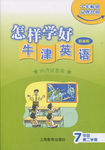题目内容
---______________? ---She’s a kind person.
A. How is your English teacher like B. What’s your English teacher like
C. What does your English teacher like D. What does your English teacher look like
练习册系列答案
 怎样学好牛津英语系列答案
怎样学好牛津英语系列答案
相关题目
题目内容
---______________? ---She’s a kind person.
A. How is your English teacher like B. What’s your English teacher like
C. What does your English teacher like D. What does your English teacher look like
 怎样学好牛津英语系列答案
怎样学好牛津英语系列答案